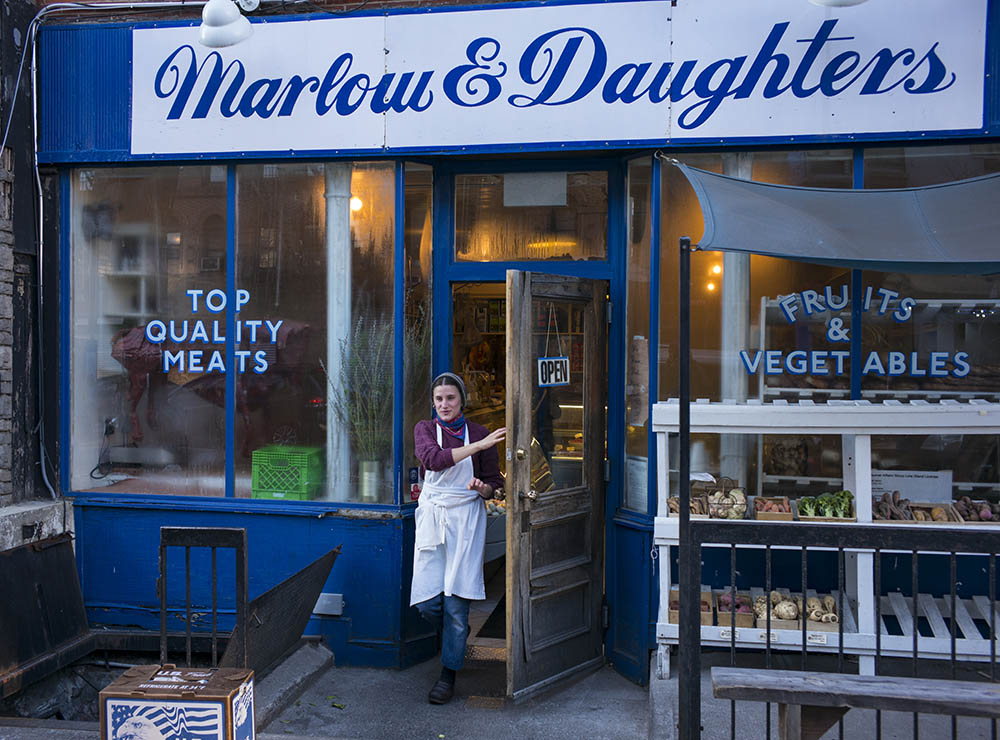When customers walk through the front door of A & E Supply Co., a restaurant and food store in Gowanus, they might barely notice the sticker on the window. But it’s not just a label, it’s a statement: “SANCTUARY RESTAURANT: a place at the table for everyone.” The message being sent? Says A & E general manager and partner Ennio Di Nino, “We want to say this is a safe place to work. No matter your race, color or creed–we don’t care. It wasn’t to be political.”
At least 18 restaurants in Brooklyn now share that status, along with many more around the U.S. The movement was launched in January in response to President Trump’s immigration policies. “The restaurant industry is one of the largest employers of immigrant and Muslim workers, so the workforce itself is extremely affected by a lot of the executive orders, proposals and rumors of policy to come,” said Sheila Maddali, spokesperson for the Sanctuary Restaurant project.
At least 18 restaurants in Brooklyn now carry signs like this one (Photo credit: Steve Koepp)
The designation is not a legal one–participants say they will comply with the law–but more of a show of support for diverse employees and customers. In the case of Di Nino, “Our motivation is that in our country right now there’s a lot of negativity” toward immigrants. “When you work in the restaurant industry there are so many people of different nationalities. Especially in New York City, which is the ultimate melting pot. Every day, you’re working elbow-to-elbow with all different types of people from different backgrounds. You become part of a family.”
Brooklyn’s Vast Diversity
An estimated 36% of New York City’s population, or about 3 millon people, are foreign-born, according to a study by the Department of City Planning. Nearly 1 million live in Brooklyn. Sunset Park contains the largest Chinatown in the city, nestled near enclaves of Dominicans, Mexicans and Ecuadorians. Central Brooklyn is home to Jamaican, Haitian and other West Indies immigrants, while Russians and Ukrainians tend to cluster in southern Brooklyn. “Restaurants that serve regional cuisine will likely suffer the most,” Maddali told The Bridge. “It’s hard to run a hospitality business when so much of the workforce and consumers are concerned about their place in this country.”
In February, the Department of Homeland Security announced that it will accelerate the process of removing people who are in the country illegally, which could cause a serious labor shortage in Brooklyn. “The only way we can see running a restaurant that is based on community is to include as many people from outside the community to be part of the community,” Andrew Tarlow told Kings County Politics. Tarlow operates multiple restaurant properties in Brooklyn, including Diner, Achilles Heel, She Wolf Bakery, Marlow & Sons, Reynard and Roman’s.
A & E Supply Co., a sanctuary restaurant and food shop, opened in November on Fourth Avenue in Gowanus (Photo credit: Steve Koepp)
To learn more about workplace rights, restaurant owners have participated in webinars produced by Restaurant Opportunities Centers United, a group dedicated to improving wages and working conditions for 12 million U.S. restaurant workers. “Our manager has tuned into the webinars,” said Carroll Gardens resident Mary Cleaver, who owns a farm in upstate New York, The Green Table restaurant in Manhattan, as well as a catering and food-kiosk business. “As the rapid changes come down from the White House,” says Cleaver, “it’s helpful to have a community to turn to that is confronting the challenges.”
‘Not About Resisting’
The hospitality and leisure industry is expected to feel the brunt of the impact of Trump’s crackdown because it is among the top three that use the most undocumented workers. An estimated 1.3 million restaurant workers in the U.S. have no documentation. Says Cleaver: “Crops will not be picked in the agricultural fields, food will not be prepped and dishes will not be washed if we deport 100% of the undocumented workers in this country. For us, joining the campaign is not about resisting but rather it’s an avenue to speak up about politics that we disagree with.”
Mary Cleaver, who operates a farm, restaurant and catering business, is an advocate for the sanctuary movement (Photo credit: Laurie Rhodes)
There’s a distinction between sanctuary restaurants and sanctuary cities. “[They] are both about preserving inclusivity and diversity,” said Maddali. “The difference between the two is that sanctuary cities are public entities that have the ability to use non-compliance as a tool to protect people who reside there, whereas restaurants are private entities that don’t legally have the power to not comply with a federal law.”
Skeptics might point out that restaurant owners have a not-so-vested interest in promoting the status quo, in which undocumented workers can slip below minimum-wage standards. Currently the minimum in New York City is $10.50 an hour for businesses employing under ten workers. But advocates for immigration reform say deportation and minimum wages are separate battles to fight. “They are parallel, not intertwined,” Cleaver said. “Sanctuary Restaurants are focused on tolerance for all. Minimum wage legislation is another issue.”
